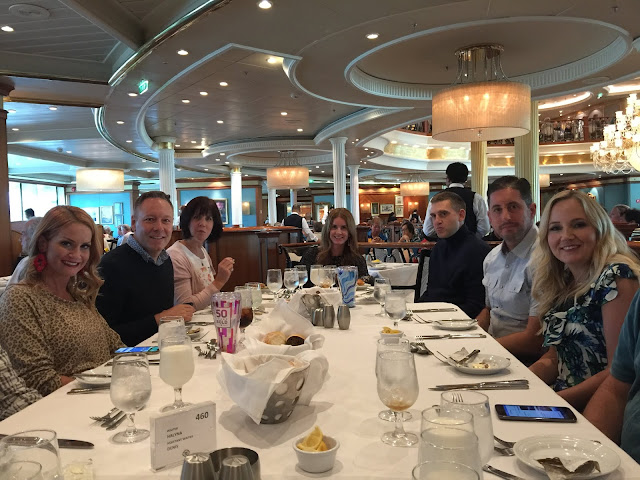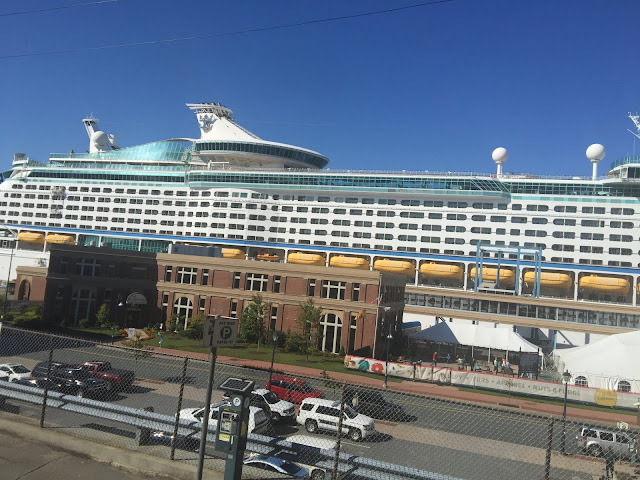St. John - New Brunswick
This was our second port - St. John was named for John the Baptist by a French colonist in 1604.With a population of 67,000+, St. John is Canada's 3rd largest port and its oldest incorporated city. We found a bus tour decided to see the sites. With a talkative tour guide, we learned a lot about the city and the area.
On our way on the bus!
Looking back at our ship in the harbor
Typical row houses on Germain St.
The Loyalist House on Union St. is a Local and a National Historical Site of Canada. There is still an active Loyalist group in St. John that celebrates "Loyalist Day" each year on May 18th with band music, special guest speakers and a gala dinner! Sounds like something every Yankee wouldn't want to miss!
Jewish Museum - preserving and displaying the Jewish history of St. John
Irving Oil Company building - Irving Oil Refinery is the largest in Canada and 80% of what it produces is exported to the USA.
We also drove by the Moosehead Brewery - which is Canada's oldest independent Brewer dating back to 1867.
 The land of Saint John is hilly and the soil throughout this area is extremely rocky with frequent granite formations.
The land of Saint John is hilly and the soil throughout this area is extremely rocky with frequent granite formations. 
We drove by this monument of a Canadian Maple Leaf made from a beautiful variety of granite found in the area.
I loved seeing all the beautiful hanging basket of flowers!
St. John is situated along the north shore of the Bay of Fundy at the mouth of the Saint John River. The city is split by the south-flowing river and the east side is bordered by the Kennebecasis River where it meets the Saint John River at Grand Bay. The Saint John River itself flows into the Bay of Fundy through a narrow gorge at the centre of the city. It contains a unique phenomenon called the Reversing Falls - where the tides of the bay reverse the water flow of the river for several kilometres.
When we visited, we could only slightly see the Reversing Falls Phenomenon as shown in the photo above. This was more pronounced at noon and we visited this site about 2:00 PM that day.
Above you can see the Martello Tower of Fort Howe from the War of 1812.
Some of our group at the formal dinner that night.
After dinner, there was a show featuring a "Mind Reader". He first spotted Allison in the crowd and called her to come up - then he called Tricia up and finally Jessica was part of the show!
He never figured out that they were sisters!
After that show we went to the ship's ice rink for an ice show which was spectacular! It was amazing to see what these professional skaters could do on such a small rink!
The last event of this very busy day was Karaoke!
Evan and Tricia sang that night.
Halifax and Sydney Nova Scotia
Our next two stops were in Nova Scotia - first was Halifax. Halifax is the capital of Nova Scotia and with a population of over 400,000, it is a major economic center in Atlantic Canada.
We spent most of our time in Halifax exploring the Maritime Museum of the Atlantic.
The museum had many interesting displays of ships, boats, lighthouses and all things connected to the sea - navigation, shipping and military operations.
The museum also contained exhibits showing the history of the December 6,1917 Halifax Explosion and Halifax’s connection with the April 1912 sinking of the Titanic and recovery of victims.
On April 17, the Halifax-based Cable Steamer Mackay-Bennett set sail with a minister, an undertaker and a cargo of ice, coffins and canvas bags. She arrived at the site on April 20 and spent five days carrying out her grim task. Her crew was able to recover 306 bodies, 116 of which had to be buried at sea. On April 26, the Mackay-Bennett left for Halifax with 190 bodies. She was relieved by the Minia, also a Halifax-based cable ship.
December 1917 saw one of the greatest disasters in Canadian history, when the SS Mont Blanc a French cargo ship carrying munitions, collided with the Belgian Relief vessel SS Imo in "The Narrows" between upper Halifax Harbour and Bedford Basin. The resulting explosion, the Halifax Explosion,devastated the Richmond District of Halifax, killing approximately 2,000 people and injuring nearly 9,000 others. The blast was the largest artificial explosion before the development of nuclear weapons. Significant aid came from Boston, strengthening the bond between the two coastal cities.
The destruction was sobering and the suffering of the many surviving burn victims unimaginable.
Sydney - Nova Scocia
Sydney is located on Cape Breton Island and was once home to one of the world's largest steel plants. Sydney has fallen on hard times since the closure of the plant in 2001. Tourism is now one of the top industries and is slowly developing since the addition of cruise ship facilities. There was not a lot to see at this port, but we had a great time.
When we disembarked from our ship, we found this huge red chair so of course we had to take lots of pictures!





There was also "The World's Largest Fiddle" which provided more photo ops!

We then walked through some of the town to see other sites.

After a 15 minute walk we arrived at the Jost House.
The Jost House is the oldest house in Sydney Nova Scotia, built in 1786.
We had the cutest guide to take our group through the home. She had a great sense of humor and really was the highlight of the tour and of our time in Sydney!
The basement of the house had a display of implements that were used in the 18th century. Life was far more difficult then than it is now.

Allison ducking to come down the stairs to the basement.
Our guide reads a copy of an old document.
After our tour, we walked into the small downtown area and explored some of the shops. Downtown Sydney is pictured below.


We walked along the waterfront back to our ship.

Dinner aboard Adventure of the Seas that evening.














































